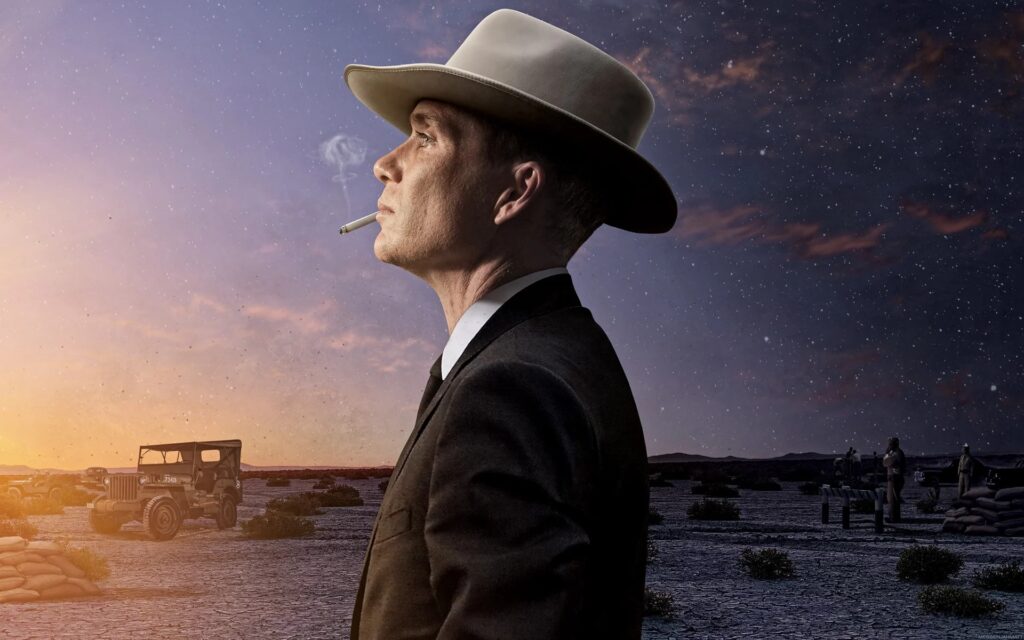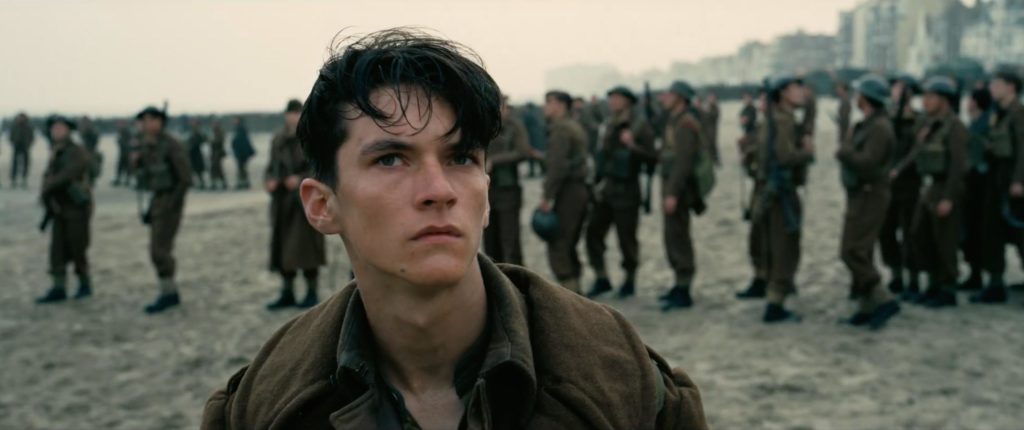
Christopher Nolan’s epic masterpiece Oppenheimer is a thrilling, three-hour psychological exploration of physicist Robert J. Oppenheimer (Cillian Murphy), who was brilliant enough to lead the development of the first atomic bomb, but could not grasp that he would then lose all control on its use.
Oppenheimer was a prima donna, but the team he assembled of star academics (31 of which had won or would win their own Nobel Prizes) was filled with prima donnas. Both a natural leader and manipulative, Oppenheimer was smoother, more practical and less politically naïve than the other scientists. But he was no match for real practitioners of politics. One character reminds him, genius is no guarantee of wisdom. The smartest person in the room makes a mistake in thinking that he can ALWAYS outthink everyone else.
Cillian Murphy, with his searing eyes and prominent cheekbones, is an actor with a striking appearance and presence. He’s always good, but he’s not the guy I would immediately think of to carry an epic; but this is Murphy’s sixth movie with Nolan, and Nolan knew that Murphy had the chops. Looking unusually gaunt, Murphy becomes Oppenheimer as he ranges from arrogant self-confidence to a creature in torment. It’s a magnificent, career-topping performance.
Himself a practitioner of the empirical, Oppenheimer, could not conceive of or understand the arena of public opinion, where lies and fear can triumph over fact and virtue. Robert Downey, Jr., in a great performance, plays Oppenheimer’s foil Lewis Strauss, a man who understands influence, political positioning and spin.
Nolan’s screenplay is based on the Oppenheimer bio American Prometheus. The mythological Prometheus brought fire to human, and was punished by the gods with perpetual torment, specifically by an eagle, each day of eternity, eating his liver anew. Oppenheimer gets the heartache of being victimized by the communist witch hunt of the 1950s and the nightmare that his monstrous creation is in the hands of those less ethical, less smart and less virtuous than he.
The Manhattan Project, the mastering of all the scientific and technological challenges in developing the first nuclear weapon, in a race with the worst villains in the history of the world – that’s fodder for an epic movie in itself. Yet that’s the backdrop to this psychological study. Together, the stories of the Bomb and Oppenheimer make for a movie that’s an astounding achievement.
The stakes could not be higher – not just life and death, but life and death on a heretofore unimagined scale. Not to mention the primary goal of stopping the Nazis. And the survival of the planet itself.
At the time, physicists could not rule out the possibility that a nuclear reaction would continue until it incinerated the atmosphere. In Oppenheimer, the scientists calculate a “near zero” chance of destroying the entire planet, giving serious pause to the scientists and alarm to lay people.
The bomb needed to be assembled and tested, of course, and the scenes of the fisrt bomb test are harrowing. Imagine putting together an atomic bomb and arming it, with 1940s technology (no robots or laser-precision machining) and THEN waiting out the winds and rain of a fierce desert storm.
There’s an emotionally surreal scene as the Los Alamos team rapturously celebrates the atomic bomb blast at Hiroshima – consumed by pride and relief that their work of over two years was successful and that it would surely end the war more quickly; but unthinking about the very real, inevitable and horrific human carnage on the ground in Hiroshima and the threat of nuclear annihilation that the world would tremble under for the rest of time. Nolan shows Oppenheimer leading the celebration, and then envisioning the horrors.
Oppenheimer is visually thrilling, thanks to Dutch-Swedish cinematographer Hoyte Van Hoytema, who already has an impressive body of work: Nope, Spectre, Ad Astra, Her, The Fighter, and Nolan’s Interstellar, Dunkirk and Tenet. Nolan, Van Hoytema and editor Jennifer Lame will undoubtedly be honored with Oscar nominations for Oppenheimer. Ludwig Göransson’s music is pretty great, too.
The cast is deep, and there are many excellent supporting performances in Oppenheimer, including:
- Emily Blunt as Oppenheimer’s wife Kitty, who doesn’t get a lot of screen time, but becomes a force as Oppenheimer comes under attack.
- Florence Pugh as a needy Oppenheimer girlfriend. I have not understood why Pugh is trending toward the A-list, but she’s really steamy here.
- Matt Damon as General Leslie Groves, the military commander who job it was, while Oppenheimer was managing a town full of divas, to manage Oppenheimer himself., once observing you’re not just self-important; you ARE important.
- Benny Safdie as the mercurial Edward Teller, who Oppenheimer keeps inside the tent, so as to not disrupt the Manhattan Project, with autonomy to develop a hydrogen bomb.
Rami Malek is glimpsed, oddly gecko-like, in the middle of the story and then pops up with a surprise near the end.
Mick LaSalle, writing on Oppenheimer, quipped that Gary Oldman “who played Winston Churchill in “The Darkest Hour,” is President Harry Truman here. If Oldman ever plays Stalin, he could do the Potsdam Conference as a one-man show.‘
Christopher Nolan and his collaborators have made a movie that runs for three hours without a single slow or dry moment, despite spending two hours on nuclear physics. I am confident in predicting that Oppenheimer will receive (and deserve) at least ten Oscar nominations and could challenge the record of fourteen.

